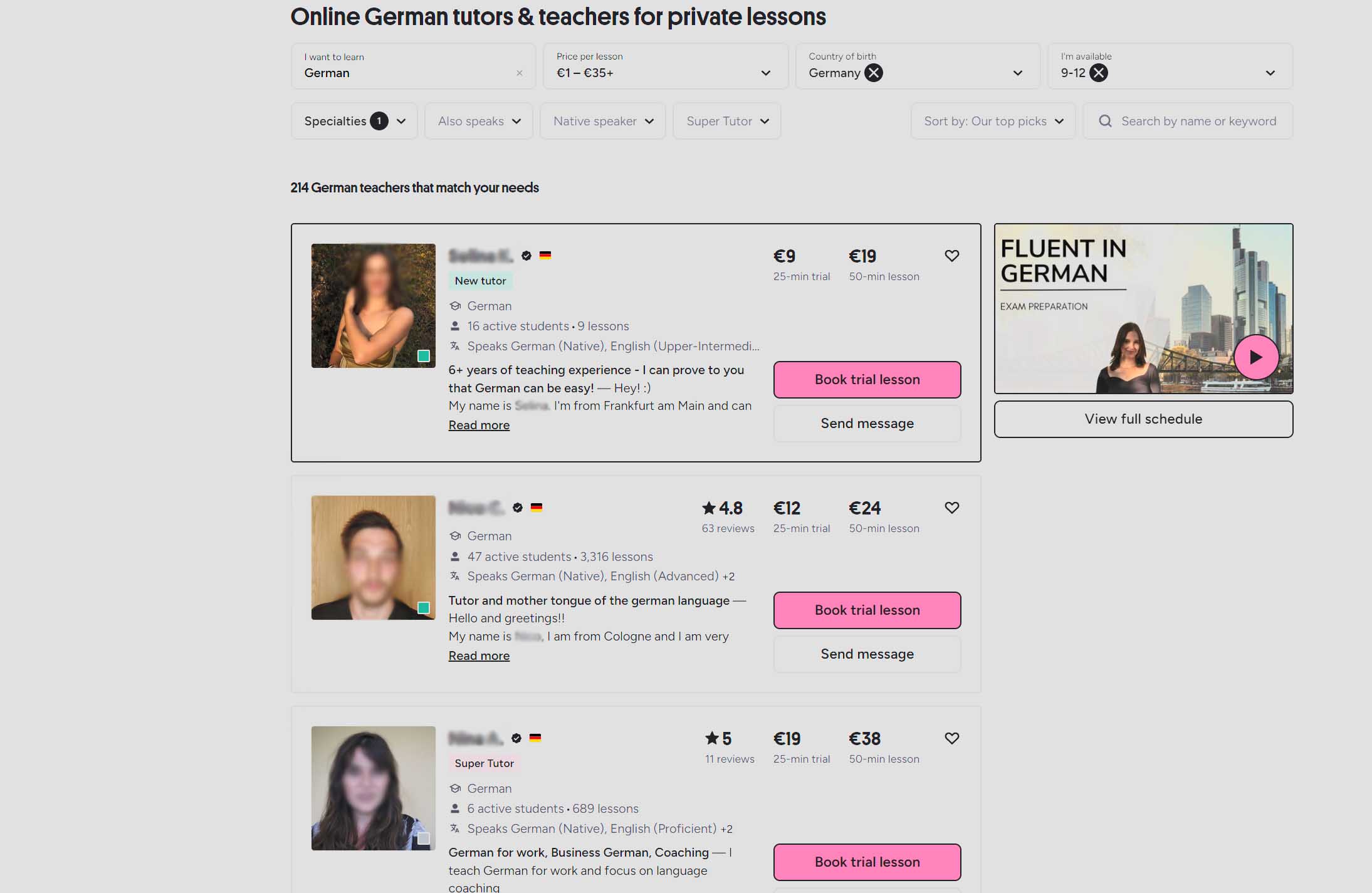What are the 1000 most frequently used nouns in German?
(This article was written 100% by a human. There are no affiliate links on this page.)
I'll start off by saying that any given German person's 1000 most frequently used nouns are going to be a bit different - obviously. A university physics professor will probably use the word "Anziehungskraft" (gravity, but literally attraction power) more than a pharmacist, who might use "Schleimhaut" (mucous membrane, but literally slime skin) even more casually. A ten year old's top words will be different from a fifty year old's, and an analysis of the FAZ (a "serious" newspaper in Germany) will yield a different collection than of BILD (a much less serious publication). And both of those will be radically different fifty years ago compared to today. So what do we do?
It depends on what you need them for.
If you're a psychologist, you might be interested in a so-called corpus (a very large set of text) sourced from the prattlings-on of toddlers and school kids of various ages to determine changing interests and developmental phases. A marketer might use the same corpus to find out what toys or tv shows are going viral on the schoolyard, and a linguist might use it to study the rate of use of multisyllabic words over time. Or something. But that's not what I, a German teacher, need them for.

My interest as a German language teacher has been primarily to make the language my students learn to be actually useful in real-world applications. Since I teach adults, I actually wouldn't need the aforementioned toddler-corpus at all. This doesn't go without saying. A lot of people believe that we should learn the language just like children do. If we did that, literally, we'd know more about dinosaurs, doll accessories and candy than... well, than whatever adults talk about. You know. Taxes and stuff.
I'm kidding about that, but think about the last few times you talked to your best friend. If we're just talking about nouns, you may have used the words "opposite", or "rumor", or "condition", or "coincidence", or "crap" (or even harsher). All words we would miss out on if we based our 1000 nouns on the wrong body of data.
My First Impressions of Preply
My first impression of the site is that its design is clean and the flow of where it wants you to go is very effortless and direct. It also becomes super clear immediately what this service is all about: Kind of like Uber hooks you up with a driver, Preply hooks you up with a private language “tutor”. After selecting the language you’re interested in (in our example we’ll use German), you can either select a tutor yourself (from over 1300 possible options – when you choose to do this the site shows you the individual tutor profiles in a long list of index cards) or you tell it a bit more about your learning goals, your current level of proficiency and whether you want a native language instructor. This, incidentally, is a discriminatory term according to the European Commission – and would be illegal as a hiring practice, if, say, Preply were to hire teachers based on this characteristic. As Preply almost certainly works with freelancers, this is much more of a grey area – though since it allows you to exclusively search for native speakers, it explicitly allows its users to discriminate. We’ll touch on what it’s like to work as a “tutor” for Preply a bit further down in this article.

It goes on, somewhat bizarrely, that you can pick a specific culture or accent that you’re “looking for”. Among the choices (for German, mind you) are India, Poland, and Ukraine, along with the more obvious Germany and Austria (but, weirdly, not Switzerland – perhaps there’s more demand for German with an Indian accent than Swiss German)… all kidding aside, Preply knows its target market, with an influx of people from India and Ukraine being a huge part of the current German learner population.
You move on past the type of German you want (certificate, conversation, very deeply on this list also Swiss German, etc.) and then on to give information about your availability and your budget, starting at (what?) 1€ per lesson and going up to 35€+ per lesson (35€, by the way, would also be considered too low by the most vocal users of popular message boards for “real” German teachers).
Is Preply Free?
So, we’ve gone into this already a bit in the previous paragraphs. The answer is: No! No part of it is free, refunds notwithstanding. You can get a trial lesson with a teacher at their regular rate (apparently the trial can also be 20 minutes, at a fraction of their full lesson price). You can select tutors based on what they charge, so in a way it’s a bit of a “pay what you want” kind of situation, as long as what you want to pay (when learning German) is at least 12€ per 50-minute lesson. I won’t stand here and say that people charging 12 Euros for 50 minutes are bad teachers or bad people, but they certainly are contributing to the profession being undervalued and professional teachers getting less than they deserve. Personally I’d like it more if Preply itself would set the bar somewhere and instate a mandatory minimum of what people can charge.

Is Preply Worth It?
I can almost certainly say that it’s worth it – if you find a teacher who’s a good match with your personality, learning style, expectation of reliability and flexibility, and ability to bring you to your goal. As with ANY situation involving live teachers (be in tandem hookups, language school classes, or teacher platforms such as this one), your success boils down, initially, to luck, how much administrative support you get from whoever is helping you organize this (i.e. a lot from a school, a little from a platform like this, and none from privately organized meetings) in case of cancellations or ghostings, and further down the line, experience in identifying right away whether something works for you or not.
There’s not much more that can be said about this. I won’t try it, because I might get a good teacher (yay) or a bad one (aw) but it won’t help me give a better evaluation of the platform and whether it’s worth the money spent.
There’s also no real way around this. Preply itself can’t make any types of promises or guarantees that the tutors are any good – in one of their own articles they write that they “continue to expand [their] understanding of what makes a tutor stand out.”
What do users think? Is Preply Good? Reddit Comments.
In this section I endeavor to summarize my impression of what people on Reddit are saying about their experience with Preply. In my opinion, Reddit is as good a forum as any to get some interesting legitimate insights and see some interesting discussions on a product or service. Much more than reviews on the app stores or Google, because who knows if the person writing them is real, has some type of agenda, has been prompted to write their review too early on (a big Udemy problem!), what the algorithm is that is showing you that particular review in the first place, and if the person writing it is similar to you at all (could be an edgy 12 year old writing). Obviously Reddit has these problems, too, but when you check a user’s post history you can get an idea of what they’re like, what their agenda is, and if they can be trusted to be real. This is especially true for reviews before 2022 and generative AI bots became sophisticated.
That being said: HOLY MOLY are there a lot of single-comment accounts writing mostly negative things about Preply on Reddit. Clearly someone has an agenda. In this review, we will ignore those single-comment throwaway accounts completely. I don’t trust them (why would someone need a throwaway account to post an impression of a language platform?). To be fair, some of the positive ones are also single-comment accounts – I will ignore those, too, and that way we’ll stay above what might just be a bot-battle between two or more language learning platforms. Might be.
Anyway. So, ensuring that the people writing are real enough, in summary I can say that many tutors who posted are unhappy with the amount of commission that Preply takes, as well as the unpaid trial lesson (which some students simply don’t show up for). This makes sense, but in my opinion is in the nature of the beast. It might seem cruel to teachers who do the trial lesson (that Preply is receiving money for) and don’t get paid for it, but in my opinion it’s an important tool to prevent just anyone from joining as a teacher and then just making money off of trial lessons that never lead to a subscription by the student.
By the way, you can tell that Preply is under attack from fake accounts because a lot of the “dissatisfied student” comments in this thread seem to be unaware that they’re on a subreddit for English teachers – indicating that they made an account and headed straight for the most recent discussion of Preply in order to share their (likely fake) bad feedback.
From a students’ perspective, the reviews are mixed, which is also to be expected, given the huge range of tutors available. Several commenters were writing along the lines that they were unhappy that if you stop at any point, Preply will remove the hours you have left in your account, or that it’s really a subscription model where you buy lesson credits each month but that they are forfeited if unused. I would also be unhappy about this – but I can see the advantage of putting pressure on students to not take long breaks between lessons and to try to learn the language regularly (the less intensively you work with the language, the less progress you make – and the more likely you are to even regress and become demotivated).
There are also many positive reviews, of people who’ve really hit it off with their teachers and can get past the billing model. I will point out that in my research of the most recent (as of April 2024) threads about Preply, almost no commenters are saying negative things about their teachers’ personality and teaching styles. However, complaint that does come up is that teachers are prone to cancelling, which, given the billing model, I understand would create a special issue on this platform. The alternative platform that people are suggesting doesn’t have some of these issues is Italki.
Please take these with a grain of salt. It’s just a general impression of some pros and cons from some vocal users (and perhaps people/bots with an agenda), but to me these comments make sense.
How does Preply compare to Deutschable?
Obligatorily, since this is nominally a “competitor analysis”, I do have to write about how this way of learning German would compare to my own site, Deutschable. I’ll keep this brief: It’s very different (live one-on-one tutor vs. self-learning video course) and not really a competing product – in fact, I think that people who learn German on Preply can easily take my course as an accompanying course, or as a prep-course before starting Preply lessons (that’s my actualy advice, because the better your German is initially, the more bang you get for your buck from a private teacher, and the better you can ask questions and focus on your weaknesses). The level of interactivity, speaking time, and flexibility of use in German in a one-to-one live lesson is obviously significant compared to a much more static self-study course. I think, if you have the right teacher, it might be a good match.
Bottom Line: Should you use Preply? Would I?
Yes. I would definitely use Preply to learn a language. I think I could tell within the first 50 minutes if I’m in good hands with the tutor. If they end up falling short, maybe I can even help them improve as teachers (I know that I sound like a nightmare to teach, haha). I think I would also get a good initial sense from the introductory video and the self-description in the tutor’s profile to see if it’s a good match. In my life I’ve interviewed hundreds off language teachers and read many times more of their cover letters to have a pretty good impression. But that’s me. My advice: Trust your gut. If you have doubts, don’t waste your money. In the end, even if you end up not getting more lessons after your trial, you’re also doing the tutor a favor by not becoming a demotivated or constant no-show student. That’s no fun for anyone.
I hope you’ve found this review helpful. Good luck in your language learning and perhaps see you in class!
About the Author
Hi, my name's Stephan and I'm the owner of Deutschable. More to the point, I've been a German and English teacher since around 2004, and since 2006 in Berlin. In this time I've worked as a freelance teacher, as well as manager and teacher trainer at language schools for adults in Germany.
It's my goal to put all of my teaching and training experience to play as I put together courses and resources for people who want to learn German. I'd be thrilled if you gave my online self-study course a shot. Enjoy and see you in class!


